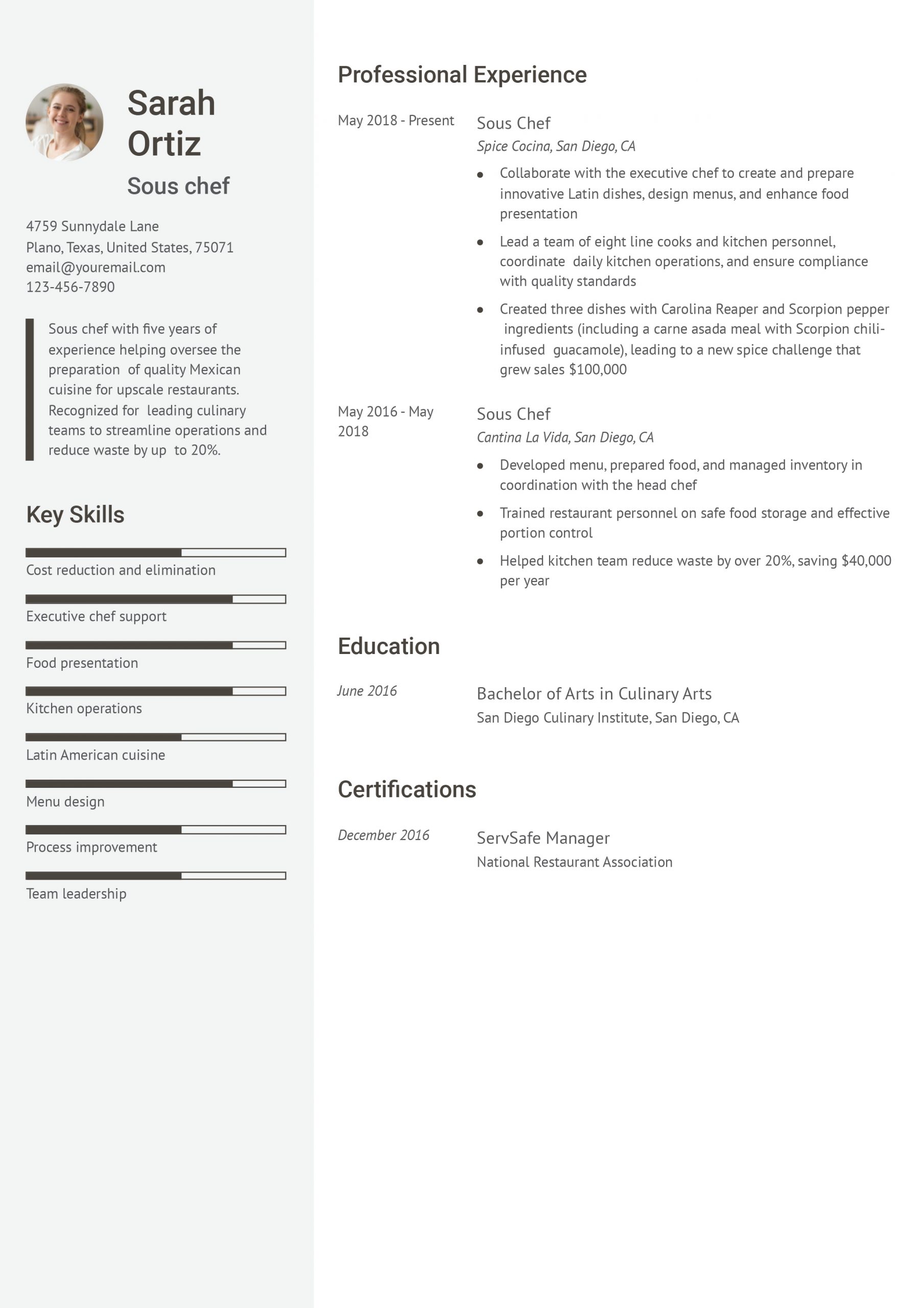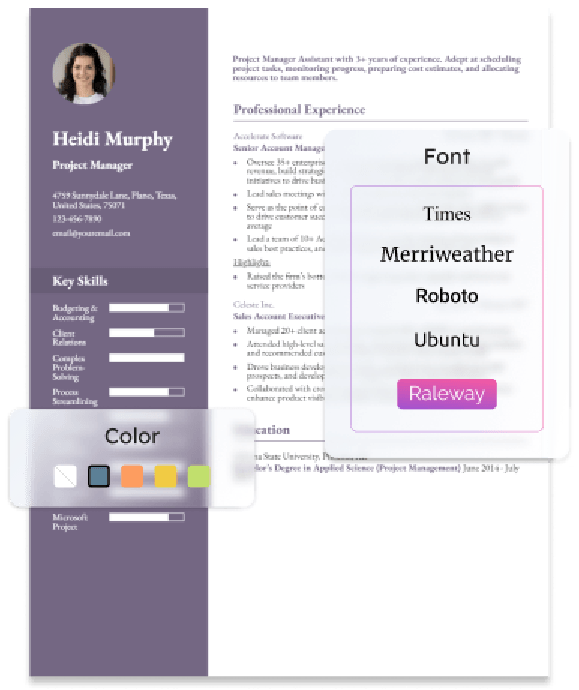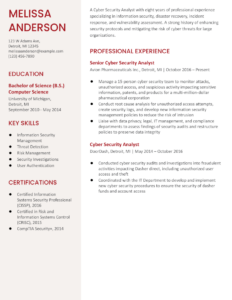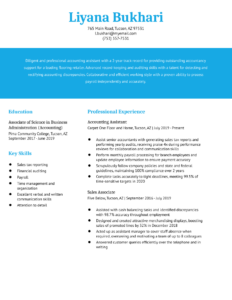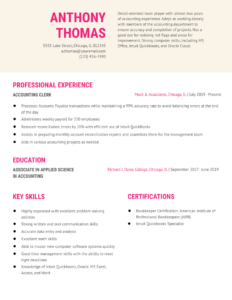How To Write a Restaurant Resume
When writing your resume for restaurant jobs, use each section to show you can help provide pleasant dining experiences to customers. The tips and examples below will help your resume display these skills — including sales, customer service, and using computer reservation systems — to get you interviews for your next restaurant job.
- Entry-level
- Mid-Career
- Senior-level
1. Create a profile by summarizing your restaurant qualifications
Catch hiring managers’ attention by giving the top three to five reasons you’ll excel in your target restaurant job. For instance, maybe you’re a dedicated manager who consistently finds ways to improve food quality and service. Or you might be a diligent sous chef with years of experience helping streamline kitchen operations. If you speak two or more languages, cite that in your profile to emphasize how to collaborate and engage with a diverse customer base.
Most job seekers find it easier to write their profile last.
Profile Example
Energetic waiter with over two years of experience in a high-volume chain restaurant. Provide courteous, attentive service while driving daily specials, appetizers, and dessert sales. Fast learner who adapts readily to new work challenges and conditions.
2. Add a compelling section featuring your restaurant experience
Use the experience section to give examples of your success in previous restaurant jobs — this helps hiring managers envision you thriving at their business. Cite times when you helped restaurants improve efficiency, food quality, sanitation, customer service, guest reservations, or the bottom line.
For instance, maybe as a waiter, you used cross-selling methods to increase orders of desserts and appetizers. Or maybe, as a restaurant manager, you updated reservation systems to help reduce guests’ average wait time. Quantify each achievement in terms of a clear percentage or dollar amount if those figures are available.
Professional Experience Example
Sous Chef, Spice Cocina, San Diego, CA | May 2018 to present
- Collaborate with the executive chef to create and prepare innovative Latin dishes, design menus, and enhance food presentation
- Lead a team of eight line cooks and kitchen personnel, coordinate daily kitchen operations, and ensure compliance with quality standards
- Created three dishes with Carolina Reaper and Scorpion pepper ingredients (including a carne asada meal with Scorpion chili-infused guacamole), leading to a new spice challenge that grew sales $100,000
3. List your education and certifications relevant to restaurant work
Give basic details on any degrees you’ve earned. Also, specify your college major, minor, or coursework if it was on a relevant topic like hospitality or culinary arts. These details can give you an edge by showing employers you have a strong knowledge base in your field. For the same reason, include any training or certifications you’ve earned that may be useful in your target restaurant job.
Below are templates and examples to help you format your education and certification details. Note, optional template areas appear in [brackets].
Education
Template
- Degree Name — [Major, Minor], School Name, [City, ST or online] | [Year]
- [Select Coursework]
Example
- Bachelor of Arts (BA) – Culinary Arts, San Diego Culinary Institute, San Diego, CA | 2016
Certification
Template
- Certification Name or Title, [Awarding Organization] | [Year]
- [Description]
Example
- ServSafe Food Handler, National Restaurant Association
4. List your key restaurant skills and proficiencies
Add a key skills section to show the various ways you can help a restaurant deliver positive dining experiences. Feel free to include soft skills, technical skills, point-of-sale (POS) systems, or various types of cuisine as long as each item overlaps in some way with your target restaurant job.
Below are some common skills and keywords for restaurant resumes:
| Key Skills and Proficiencies | |
|---|---|
| Budgeting and cost accounting | Conflict resolution |
| Cost reduction and elimination | Customer service and satisfaction |
| Efficiency improvement | Executive chef support |
| Food and beverage service | Food presentation |
| High-volume restaurant operations | Kitchen operations |
| Latin American cuisine | Lightspeed POS |
| Marketing strategy development | Menu and order memorization |
| Menu design | Payment processing |
| Process improvement | Regulatory compliance |
| Staff training and coaching | Talent retention |
| Task prioritization | Team collaboration |
| Team leadership and motivation | Time management |
How To Pick the Best Restaurant Resume Template
As with most vocations, restaurant workers should use a resume template that’s clear and straightforward. Opt for a layout that lets the hiring manager quickly spot your best career details. Select a traditional resume font, and avoid any template with a colorful or elaborate design. Also, ensure the template complies with applicant tracking systems (ATS) employers use to screen resumes.
Restaurant Text-Only Resume Templates and Examples
- Example #1
- Example #2
- Example #3
Sarah Ortiz
(123) 456-7890 | [email protected] | San Diego, CA 12345 | www.linkedin.com/example
Profile
Sous chef with five years of experience helping oversee the preparation of quality Mexican cuisine for upscale restaurants. Recognized for leading culinary teams to streamline operations and reduce waste by up to 20%.
Key Skills
- Cost reduction and elimination
- Executive chef support
- Food presentation
- Kitchen operations
- Latin American cuisine
- Menu design
- Process improvement
- Team leadership
Professional Experience
Sous Chef, Spice Cocina, San Diego, CA | May 2018 to present
- Collaborate with the executive chef to create and prepare innovative Latin dishes, design menus, and enhance food presentation
- Lead a team of eight line cooks and kitchen personnel, coordinate daily kitchen operations, and ensure compliance with quality standards
- Created three dishes with Carolina Reaper and Scorpion pepper ingredients (including a carne asada meal with Scorpion chili-infused guacamole), leading to a new spice challenge that grew sales $100,000
Sous Chef, Cantina La Vida, San Diego, CA | May 2016 to May 2018
- Developed menu, prepared food, and managed inventory in coordination with the head chef
- Trained restaurant personnel on safe food storage and effective portion control
- Helped kitchen team reduce waste by over 20%, saving $40,000 per year
Education
Bachelor of Arts (BA) – Culinary Arts, San Diego Culinary Institute, San Diego, CA | 2016
Certification
ServSafe Manager, National Restaurant Association | 2016

1. What are the most in-demand skills for restaurant work that should be featured on a candidate’s resume?-
The following hard and soft skills would be in demand on most restaurant candidate’s resumes.
Hard skills:
- Knowledge of all restaurant positions (culinary manager, hospitality manager, service manager)
- Financial management and budgeting
- Understanding of health and safety regulations
- Knowledge of food and beverage operations
- Inventory management
- Sales and marketing skills
- Understanding of POS systems
- Familiarity with restaurant industry trends
- Knowledge of labor laws
- Tech-savviness
- Understanding of restaurant KPIs
- Knowledge of menu engineering
- Data analysis skills
- Understanding of supply chain management
- Knowledge of wine and spirits
- Experience with event planning
- Ability to develop and implement marketing strategies
- Proficiency in a second language (optional but beneficial)
- Experience with employee scheduling
- Understanding of local food and drink regulations
- Experience with social media marketing
- Understanding of dietary restrictions and allergies
Soft skills:
- Excellent communication skills
- Leadership abilities
- Strong problem-solving skills
- Time management abilities
- Adaptability in various situations
- Teamwork and collaboration
- Creativity in problem-solving and innovation
- Passion for food and hospitality
- Ability to handle pressure and stress
- Strong customer service skills
- Conflict resolution abilities
- Decision-making skills
- Staff recruitment and training
- Attention to detail
- Negotiation skills
- Multi-tasking abilities
- Interpersonal skills
- Cultural awareness
- Project management skills
- Ability to uphold brand standards
- Ability to foster a positive work environment
- Listening skills
- Ability to implement and manage change
- Ability to motivate staff
- Ability to create and maintain relationships with vendors
- Strong work ethic
- Ability to cultivate a loyal customer base
- Ability to handle constructive criticism and feedback
2. What work experience and other accomplishments are hiring managers looking for in a restaurant employee?-
I would look for a proven track record in a similar role is essential. This includes experience in managing daily operations of a restaurant, dealing with staff, customers, and suppliers, and making sure the restaurant meets its profitability goals.
Also, exceptional customer service skills are a must. Restaurant managers need to ensure customer satisfaction by providing excellent food and service. Understanding of financial management is crucial. This includes managing budgets, controlling costs, and ensuring the restaurant's profitability.
Strong supervisory and leadership skills are required. This includes the ability to motivate and manage a team, resolve conflicts, and make important decisions. Additionally, an understanding of state and industry regulations is necessary to ensure compliance. Depending on the role, experience in developing and implementing menu items can be a valuable skill. This includes understanding customer preferences and current food trends.
For leadership roles, the ability to hire, train, and retain staff is crucial. This includes conducting interviews, providing training, and overseeing staff development. Also, experience in marketing the restaurant through various channels, including social media, is increasingly important. As technology evolves, being comfortable using restaurant management software and digital platforms for ordering, reservations, and customer feedback is becoming more important.
With the growing demand for sustainability, knowledge, and implementation of sustainable practices in the restaurant industry could be a plus.
3. What else besides a resume should a restaurant candidate be prepared to provide hiring managers?-
Candidates should articulate their management style and how it aligns with the restaurant's culture. This could be in the form of a written statement or during an interview. Also, showcase your leadership qualities, through examples of teams they've led, successful projects you’ve spearheaded, or your approach to team development and training. Provide a detailed account of their previous management experiences, including the size of the teams you’ve managed and the volume of business you’ve overseen. If possible share metrics around employee retention at past jobs.
Highlight specific accomplishments in your career. This can include instances where they have increased sales, improved customer satisfaction, or successfully managed a busy shift. Be ready to provide references from past employers, colleagues, or even subordinates. These references can provide insights into the candidate's work ethic, reliability, and effectiveness as a manager.
4. What advice would you give a restaurant candidate about their job search? -
In your resume and cover letter, emphasize your skills that align with the demands of a restaurant manager. Key skills often include team management, customer service, budgeting, marketing, and knowledge of food safety regulations. Demonstrating proficiency in using restaurant management software will also give you an edge.
To excel as a restaurant manager, you need to be a great communicator, a problem solver, and a high degree of adaptability. Providing examples of these qualities during your interview will prove advantageous.
Attend industry events, engage with online communities, and join professional hospitality associations to build your network. These connections can provide valuable insights and potential job opportunities. Staying up-to-date with industry trends will prepare you for your role and demonstrate your passion for the industry to potential employers. To stay informed, subscribe to industry publications, attend webinars, and follow influential figures in the hospitality sector on social media.
Frequently Asked Questions: Restaurant Resume Examples and Advice
What are common action verbs for restaurant resumes? -
One of the best ways to enhance your resume is by starting each bullet point with a strong action verb. Dynamic verbs keep the hiring manager’s attention and show the varied nature of your experience. The following list can help you find a good mix of action verbs for your restaurant resume:
| Action Verbs | |
|---|---|
| Collaborated | Cooked |
| Coordinated | Created |
| Delivered | Enhanced |
| Expedited | Generated |
| Improved | Increased |
| Introduced | Organized |
| Prepared | Prevented |
| Provided | Ranked |
| Reduced | Reported |
| Retrieved | Served |
| Stocked | Streamlined |
| Strengthened | Won |
How do you align your restaurant resume with a job posting?-
The Bureau of Labor Statistics forecasts that between 2022 and 2032, jobs for food preparation and serving will increase at the average rate for all U.S. jobs, with around 2.5 million openings per year.
You can get more interviews in this growing industry if you tailor your resume for each application. Look at the job post and highlight words that are repeated, emphasized, or otherwise seem important. These key words can tell you what details you may want to feature in your resume profile or key skills sections (as long as they’re accurate to your experience).
Another great way to tailor your resume is by adding brief descriptions of the restaurants where you’ve worked, in [brackets] right next to or below the restaurant name. Restaurant descriptions let you show any similarities between your past employers and the one who posted the job. For example, maybe you’ve worked for restaurants of a similar size or cuisine. Or you might have worked at restaurants with a similar service model, such as family style, fast-casual, or fine dining. Working these details into your descriptions makes your resume more relevant to the job opening.
What is the best restaurant resume format? -
Most restaurant workers should use the combination (or hybrid) format. True to its name, this format combines two important features of other resume formats: the chronological format’s experience section and the functional format’s profile section. (The resume examples on this page all use combination format.)
A combination resume offers the best of both worlds by fusing these two features. The experience section lets you outline your recent work history – essential information for most employers. At the same time, the profile section lets you display your career highlights at the top, regardless of whether they’re from that work history or another part of your background. As a result, you can present yourself both clearly and strategically. With this format, you give hiring managers the best view of your experience and relevant strengths, so they can make an informed decision to call you for an interview.
Craft your perfect resume in minutes
Get 2x more interviews with Resume Builder. Access Pro Plan features for a limited time!

